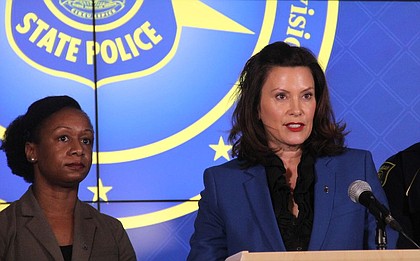Trump Complicit in Whitmer Kidnap Plot
Jesse Jackson | 10/16/2020, 6:08 a.m.
Political rhetoric can incite. Incendiary posturing can trigger those who carry matches. We've now seen this play out dramatically in Michigan. Last week, six men, members of a right-wing militia group calling themselves the Wolverine Watchmen, were arrested and charged with plotting to kidnap Gov. Gretchen Whitmer of Michigan before the November elections. Seven others were charged under Michigan's anti-terrorism law for allegedly seeking to recruit an army of 200 to storm the Michigan Capitol and ignite a "civil war."
The plot went far beyond the Facebook bluster. The defendants, according to the complaint, held "field training exercises," purchased a taser for use in the kidnapping, tested an explosive device, possessed and trained with firearms, and conducted surveillance of Whitmer's vacation home, and of a bridge that might be blown up to impede police response.
One argued that they should put the governor on trial for treason. Another allegedly urged: "Snatch and grab man. Grab the f* governor. Just grab the b*. Because at that point ... it's over." Another suggested, "Have one person go to her house. Knock on the door and when she answers it just cap her."
This right-wing domestic terrorism doesn't fester in a vacuum. Faced with the pandemic, Gov. Whitmer acted to protect the citizens of her state, closing down private facilities, requiring the wearing of masks and social distancing. She pushed publicly for needed protective equipment in the face of the federal government's disarray. Donald Trump, who seems to be threatened by strong women leaders, repeatedly called her out personally. Republicans in the state legislature called her a "tyrant," and railed against her actions, even though most Michigan residents supported her efforts to fight the spread of the coronavirus.
The festering anger broke out in a stunning demonstration in April when a large rally, featuring Trump posters, swastikas, Confederate flags, Hawaiian shirts (symbol of the anti-government "boogaloo" movement) surrounded the capitol. Men in fatigues carrying assault rifles filled the galleries of the Capitol yelling threats at the legislators below. According to police, NRA promoted "open carry" laws left them powerless to stop them.
The Republican speaker of the House said, "There's nothing more American than people coming together to ensure their voices are being heard." Trump responded not by criticizing the demonstrators, but by tweeting "LIBERATE MICHIGAN."
Even though Trump chose not to create national standards and left the states to operate on their own, he continued to criticize Whitmer and others for not opening their economies faster. He spewed out tweets as though he was an adolescent shooting spitballs when the teacher's back is turned.
Only he isn't an adolescent; he's president of the United States. And his incendiary words incite.
Republican legislators in the state took up Trump's follies, joining in scorning masks as oppressive, and denouncing the governor in harsh terms, calling her actions to stop the spread of the pandemic "tyrannical," comparing them to the Japanese attack on Pearl Harbor, labeling her a dictator. Signs like "tyrants get the rope," "Ditch the Witch" and "Heil Whitler" began to appear alongside Confederate flags and calls to "Let us free from tyranny."A Republican leader in the Senate joined with the armed demonstrators in a rally. One of those on the stage was later indicted as part of the plot against the governor.
Asked to denounce white supremacy and the right-wing militia Proud Boys in the first presidential debate, Trump memorably called on them to "stand back and stand by." The Proud Boys took that as a mandate and a slogan. The plotters were emboldened.
When the plot came out, Whitmer drew the inescapable connections: "When our leaders meet with, encourage, or fraternize with domestic terrorists, they legitimize their actions and they are complicit. When they stoke and contribute to hate speech, they are complicit."
"Just last week, the president of the United States stood before the American people and refused to condemn white supremacists and hate groups like these two Michigan militia groups," Whitmer said, noting that those who were plotting to kidnap her had "heard the president's words not as a rebuke but as a rallying cry -- as a call to action."
Rather than apologize, the head of the state Republican Party released a letter criticizing Whitmer for not warning legislators about the plot. Trump complained that she hadn't thanked him for the work of the FBI, and sniped once more at her, "Gov. Whitmer of Michigan has done a terrible job. She locked down her state for everyone, except her husband's boating activities."
As a former Trump Homeland Security official, Miles Taylor, has argued, "[T]he president's rhetoric has served as a loaded gun for those groups who have since taken his words as sort of permission to do what they're doing."
American politics is often bare-fisted. In the heat of a campaign, rhetoric can get overheated. When the country is as polarized as this one, the rhetoric can go over the top. But responsible leaders seek to bring us together, not drive us apart; they appeal to the better angels of our character, not our worst fears or prejudices. They try to find ways to reach out to those who are alienated or fearful. What a leader cannot do is fan their hatred or appear to give them permission for violence.
You can write to the Rev. Jesse Jackson in care of this newspaper or by email at jjackson@rainbowpush.org. Follow him on Twitter @RevJJackson.





